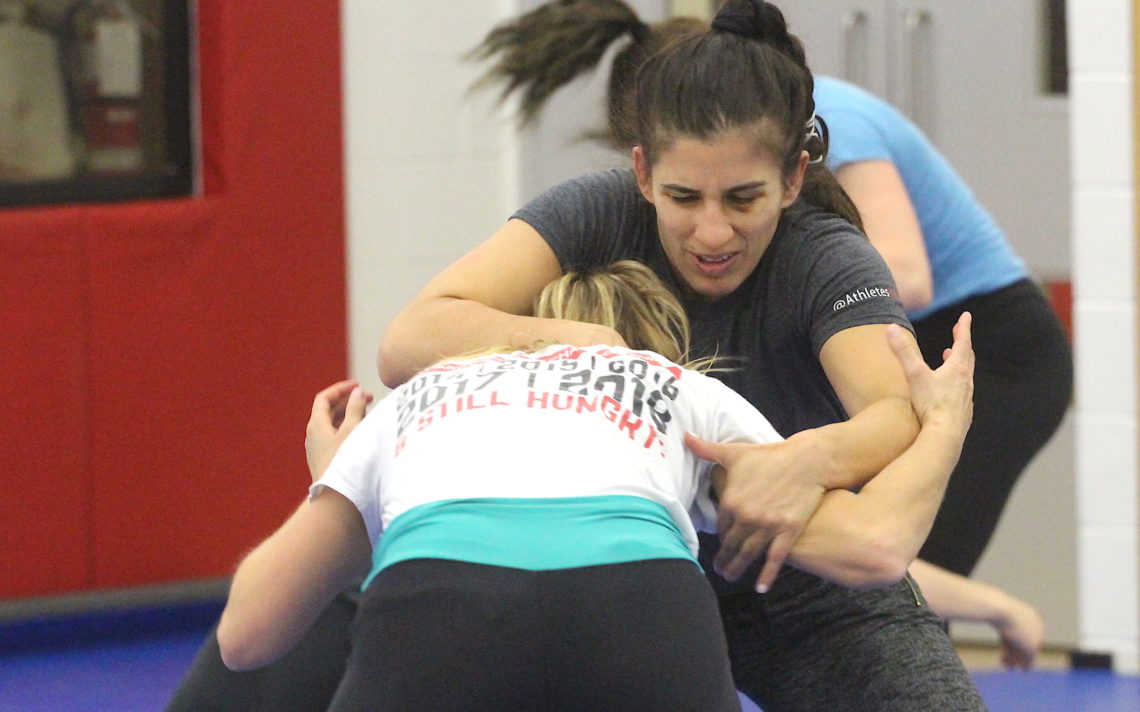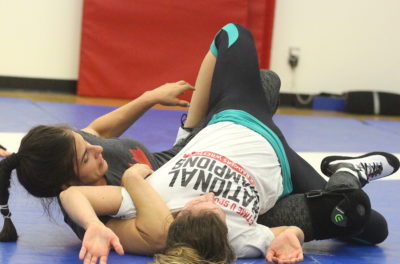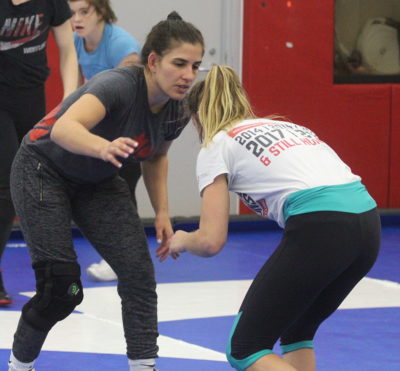
Olympic trials and tribulations
It would take thousands of words to describe the litany of injuries suffered by wrestler Michelle Fazzari.
 The 32-year-old Caledonia native captured her first Canadian title in 2012, two years after being told a shoulder injury would prevent her from ever wrestling again at a high level. In 2015, she placed seventh at the Pan Am Games, three weeks after undergoing knee surgery.
The 32-year-old Caledonia native captured her first Canadian title in 2012, two years after being told a shoulder injury would prevent her from ever wrestling again at a high level. In 2015, she placed seventh at the Pan Am Games, three weeks after undergoing knee surgery.
Her latest encounter with the injury bug came in April 2018, 20 seconds into the 62-kilogram final at the Commonwealth Games in Australia.
“In the first 10 seconds of the match, I could feel my knee just pop,” the Cayuga Secondary School alumnus said. “I didn’t know what ligament it was because I did so many at that time. I thought maybe I would be OK if I could wiggle it around a little bit but then I pivoted and it just exploded.”
She was unable to walk and had to be carried off the mat.
“We knew my ACL was completely detached and that was the only thing we knew at that time.”
Further tests revealed a multitude of other injuries to the knee that hurt like heck and used up almost every letter of the alphabet to describe which parts of the knee were damaged. About the only part of the knee that wasn’t messed up was her PCL.
It took four weeks for the swelling to go down enough that the doctors could perform surgery in May 2018.
“If I had to get anywhere, I was wheeling around in a wheelchair,” she said. “Then it was crutches and it was still really hard to walk.”
Months of missed rehabilitation targets had doctors wondering what was going on and exploratory surgery was performed in late February. Doctors found Fazzari was suffering from a Cyclops lesion, a painful anterior knee mass that arises as a complication of anterior cruciate ligament reconstruction.
“I think I just had so much trauma and that’s why it formed,” she said.
 Following the second surgery, she spent three months rehabbing in Calgary.
Following the second surgery, she spent three months rehabbing in Calgary.
‘I have a great therapy team here and everything is great here but I needed a change and I was getting so down and losing sight of my goals,” she said. “There was things I could have been doing like eating a bit healthier, but it was like bring on the pizza because things are not looking good.”
Fazzari would be lying if she said there weren’t moments when she wondered if it was really worth all the aggravation.
“Even learning how to walk again, heel, toe, heel, toe and side shuffle and I was thinking why was it so hard,” she said. “I had no concept of what normal was after awhile because I had been in pain for so long.”
Her rehab was as much mental as physical.
“There has been a lot of why am I doing this and why am I still going to practice moments and there were days when I was thinking that it wasn’t for me any more,” she said. “Having those tough conversations and meeting up with sports psychologists, it’s OK to have doubt and it’s OK to take it week by week. That has been my motto.”
Fazzari just returned from a week-long training camp in Iowa.
“October has been a big month for me. It is the first month I could go full out on the mats.”
It’s so far, so good as of this week and it’s a nice change.
 “For a long time, I would do something and then have to scale it back. Trying not to take one step forwards and two steps backwards was another hurdle.”
“For a long time, I would do something and then have to scale it back. Trying not to take one step forwards and two steps backwards was another hurdle.”
All of her work is in preparation for the Canadian Olympic wrestling trials Dec. 6-8 in Niagara.
“I don’t talk about it too much because it has been such a crazy journey for me,” she said. “I’ve been taking it day by day and we are down to 44 days before the trials.
“I may not be where I expect myself to be but wherever I am, I will be OK.”
Fazzari has been chasing the Olympic dream since serving as the training partner for Tonya Verbeek at the 2012 Olympics in London, England.
“I had wrestled all those people before and whether I won or loss I was definitely competitive. That is when I knew that is what I wanted.”
Four years later, she represented Canada at the 2016 Olympics in Rio de Janeiro, Brazil. She’s not sure why its so important to be a two-time Olympian.
“I have literally asked myself that every day,” she said, with a laugh. “It is so different than 2016 where I wanted to be an Olympian so much and it had been what I had been training for years to do.”
Her motivations are much different this time around.
 “When I came back after 2016, it was for pure joy; my enjoyment for the sport and my passion for the sport,” she said. “It isn’t result-driven at all. It is that I love the training.”
“When I came back after 2016, it was for pure joy; my enjoyment for the sport and my passion for the sport,” she said. “It isn’t result-driven at all. It is that I love the training.”
She has always appreciated wrestling and knows that the sport has given her many opportunities.
“I am so thankful for every day, especially after being stuck in a wheelchair or crutches,” she said. “I am very fortunate to even have the ability to wrestle.”
But just being able to wrestle again won’t be enough for Fazzari when she steps on the mat at the Olympic trials.
“I know I said it’s not results driven but I want to compete well there and if I am going to the Olympic trials, I am going there to win,” she said.
This story is the firsts in a series profiling Brock Wrestling Club members who will be competing at the Olympics trials Dec. 6-8 in Niagara.

























